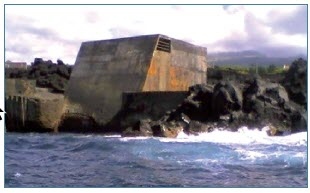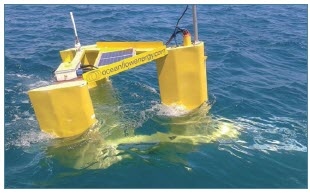PORTUGAL
TECHNOLOGY DEMONSTRATION
OPEN SEA TEST SITES
During 2017 efforts were initiated to build a structured plan for developing testing infrastructures for different TRLs, providing technical support to developers, in order to attract projects to Portugal. The following test sites were proposed:
Viana do Castelo Pilot Zone – Offshore Farm Site
Following the Governmental decision in December 2016, a Pilot Zone for offshore wind and wave energy will be settle in Viana do Castelo (Northern coast of Portugal), managed by REN (the Portuguese TSO), where a first 25 MW WindFloat farm will be deployed in 2019. A 17 km electrical cable and an onshore electrical substation will allow other offshore energy technologies to be demonstrated. This site, located in depths between 85 and 100m, is currently being licensed for the installation of the Windfloat Atlantic Project. The Portuguese Pilot Zone created in 2010 at São Pedro de Moel has moved to this area. Currently the electrical infrastructure (onshore substation + static cable) is being designed and a tender has been launched by REN for a 200 MW cable.
Aguçadoura testing site - Offshore Test Site
This is a 4 MW grid connected offshore testing site offshore Póvoa de Varzim, for wave and offshore wind, which belongs to EDP and EFACEC. The test site, in 50 m water depth, is composed by a 6 km 4 MW offshore electrical cable, an onshore monitoring station and an onshore electrical substation. Previous devices tested at the Aguçadoura site comprised: the AWS wave power device (2000-2004), the Pelamis wave farm (2007 – 2008) and the WindFloat floating wind turbine (2011 - 2016).
Sines – Ocean Technology Incubation Centre
Sines Port Authority, WavEC and other Portuguese and Dutch companies have recently signed an agreement to develop a test centre for partial scale non-grid connected wave energy prototypes. A Letter of Intent signed in October 2017 foresees consenting of this infrastructure within the Port jurisdiction.
Peniche – Ocean Technology Centre
The Peniche Shipyard with a number of entities have been preparing a proposal to develop an ocean technology centre at Peniche Shipyard with a focus on the development and study of materials and its interaction with the ocean environment.
OPERATIONAL PROJECTS
|
In 2017, Pico Plant, on the Island of Pico, Azores, was still running, but a decision has been taken to decommission the plant which has achieved 10 years of continuous operation. It is a shoreline OWC (Oscillating Water Column) wave energy pilot plant (www.pico-owc.net) built in 1995-1998 with support from the European Commission. It is operated by WavEC and during the last decade, it has been used as a research and training facility. |
 |
|
|
The UK-based tidal energy developer Oceanflow Energy has been testing their Evopod E1 unit at Ria Formosa, a coastal lagoon in the south of Portugal. This demonstration project at 1:10 scale has been conducted by the Marine Offshore Renewable Energy (MORE) team from the University of Algarve as part of European funded project SCORE whose goal is to examine the behaviour of small scale tidal current turbine in a shallow water estuarine environment. The project started in April 2016 and will run for 3 years. |
 |
PLANNED DEPLOYMENTS
WaveRoller
During the year 2017, AW-Energy made significant progress in its commercial roll-out as the company secured an EPC agreement with Wärtsilä in September. Wärtsilä will now be selling WaveRoller technology on a turn-key basis throughout the life cycle. Another milepost was reached in August when Lloyd’s Register issued WaveRoller the first Design Appraisal Certificate to be awarded in the wave energy industry. AW-Energy has also been working with external partners, such as WavEC Offshore Renewables and Queen’s University Belfast, to further research and develop its product. AW-Energy’s FOAK pilot project site in Peniche, Portugal, is now fully licensed. In addition, 8 MWA grid capacity is secured for commercial instalment and being prepared for customer use.



